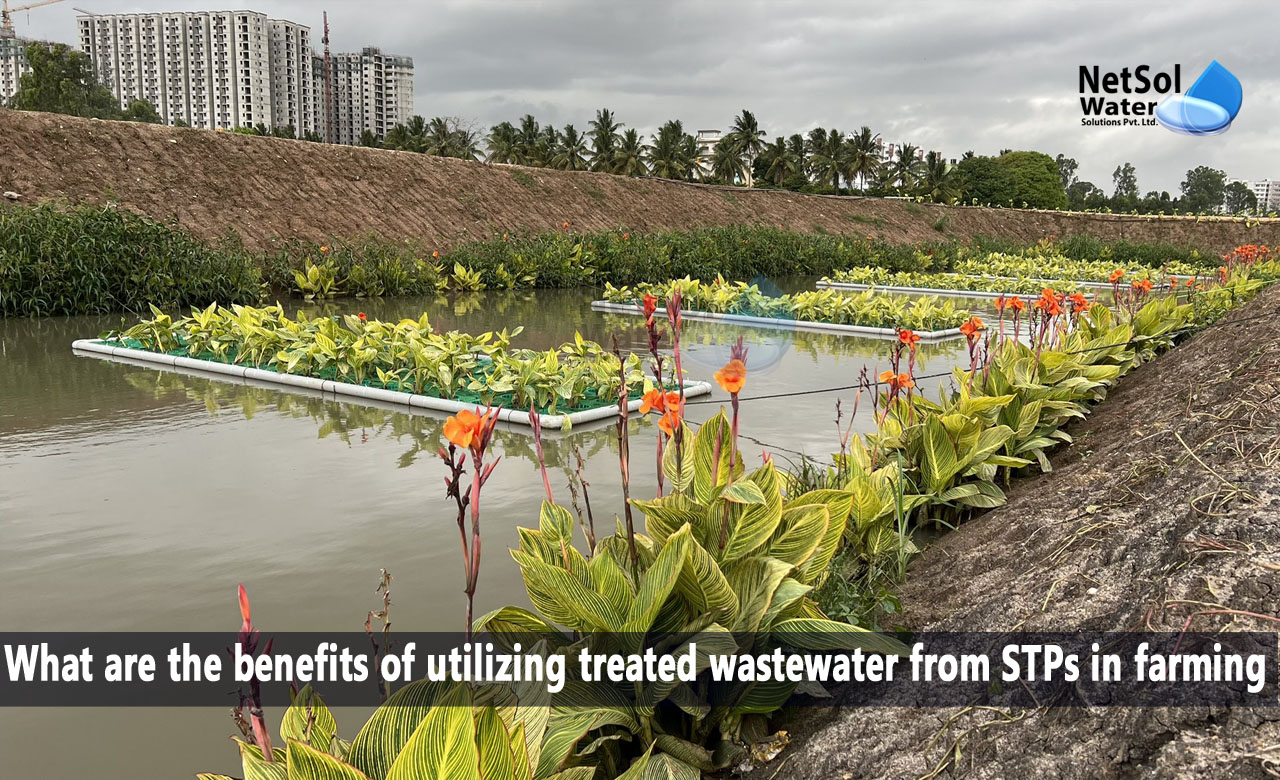Benefits of utilizing treated wastewater from STPs in farming
Sewage treatment plants (STPs) play a vital role in treating and managing wastewater generated from residential, commercial, and industrial activities. While the primary purpose of STPs is to protect public health and the environment, they also offer significant opportunities for wastewater reuse in agriculture. This blog explores the benefits of utilizing treated wastewater from STPs in farming, highlighting its potential to enhance agricultural productivity, conserve freshwater resources, and promote sustainable farming practices.
1. Wastewater Treatment and Quality:
STPs employ advanced treatment processes to remove contaminants, organic matter, and pathogens from wastewater. Through various physical, chemical, and biological treatment methods, the treated wastewater, also known as reclaimed water or effluent, can meet specific quality standards for agricultural reuse. The quality of the treated wastewater is closely monitored to ensure it is safe for irrigation purposes.
2. Water Conservation and Availability:
a. Supplemental Water Supply: Utilizing treated wastewater in agriculture reduces the demand for freshwater sources, which are often limited and subject to competing needs. By supplementing traditional irrigation water with reclaimed water, farmers can preserve freshwater resources for other essential uses.
b. Drought Resilience: Treated wastewater can serve as a reliable water source during periods of drought or water scarcity. As climate change exacerbates water stress, the availability of wastewater for irrigation purposes becomes increasingly valuable in maintaining agricultural productivity and resilience.
3. Nutrient Enrichment and Soil Fertility:
a. Nutrient Content: Treated wastewater from STPs contains essential nutrients, such as nitrogen, phosphorus, and potassium, which are beneficial for plant growth. By using reclaimed water for irrigation, farmers can supply crops with these nutrients, reducing the reliance on chemical fertilizers.
b. Organic Matter: The organic content present in treated wastewater enhances soil fertility and structure. Reclaimed water provides organic matter that improves soil moisture retention, nutrient-holding capacity, and overall soil health, contributing to sustainable agricultural practices.
4. Economic Benefits:
a. Cost Savings: Utilizing treated wastewater can significantly reduce farmers' dependence on expensive freshwater sources. By incorporating reclaimed water into their irrigation systems, farmers can lower operational costs and increase profitability.
b. Revenue Generation: Some STPs implement water reuse programs where farmers can purchase treated wastewater at a lower cost than freshwater. This creates additional revenue streams for STPs and promotes collaborative partnerships between wastewater utilities and agricultural communities.
5. Environmental Sustainability:
a. Reduction of Pollution: By diverting treated wastewater from STPs to agricultural fields, the potential pollution and environmental impact of discharging it into water bodies are minimized. This practice helps preserve the quality of natural water resources and protects ecosystems from excess nutrient runoff.
b. Carbon Footprint Reduction: Utilizing treated wastewater for irrigation reduces the energy-intensive processes involved in treating freshwater sources. By reducing the need for pumping, treatment, and distribution of freshwater, greenhouse gas emissions associated with water supply systems can be mitigated.
6. Regulatory Considerations:
Reclaimed water used in agriculture is subject to regulatory guidelines and quality standards to ensure safety and environmental protection. These regulations specify the appropriate treatment processes, monitoring requirements, and crop-specific guidelines for using reclaimed water in irrigation.
Conclusion:
The integration of sewage treatment plants and agriculture through wastewater reuse presents significant benefits for both sectors and the environment. Utilizing treated wastewater in farming conserves freshwater resources, enhances soil fertility, and promotes sustainable agricultural practices. By reducing the reliance on chemical fertilizers and costly freshwater sources, farmers can improve economic viability and contribute to water conservation efforts. However, careful planning, adherence to regulatory guidelines, and ongoing monitoring are crucial to ensure the safe and effective use of reclaimed water in agriculture. With proper management, the symbiotic relationship between sewage treatment plants and agriculture can foster a sustainable and resilient food production system for the future.
Netsol Water is Greater Noida-based leading water & wastewater treatment plant manufacturer. We are industry's most demanding company based on client review and work quality. We are known as best commercial RO plant manufacturers, industrial RO plant manufacturer, sewage treatment plant manufacturer, Water Softener Plant Manufacturers and effluent treatment plant manufacturers. Apart from this 24x7 customer support is our USP. Call on +91-9650608473, or write us at enquiry@netsolwater.com for any support, inquiry or product-purchase related query.



